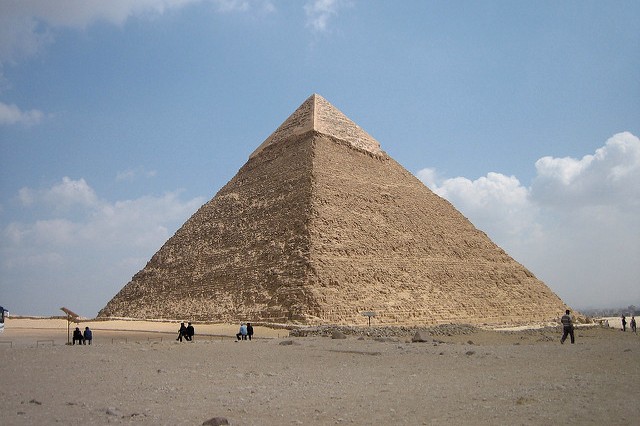This week’s top stories include a series of hearings about social media and Russian interference in the 2016 US election, the discovery of a “void” inside the Great Pyramid, and the under-subscribed retraining classes for former coal miners. It’s the science and technology roundup for Sunday, November 5, 2017!
Antisocial Media Hearings
This week saw days of testimony in hearings about the Russian influence on US elections through social media platforms like Facebook and Twitter, and the media giants took a beating all around. It seems the one thing most Democrats and Republicans can agree on is that Russians shouldn’t be able to use these platforms to subvert the democratic process in the US, and even the Republicans are starting to threaten legislative solutions. And that’s probably fair: it looks as though ads intended to foment civil unrest were placed by Russians and shown to over 130 million people on Facebook alone. Hell, sometimes they didn’t even bother to ttry to hide it, paying IN RUBLES. If Facebook and Twitter can’t get their acts together, the government is going to have no choice but to legislate them into action, and it won’t be as kind to the companies as the companies are currently being to their own wallets. You can read more at ThinkProgress.

A New Secret of the Great Pyramid
A new study published in the journal Nature this week announced that there may be a very large, undiscovered room in the Great Pyramid, and it was found using muons from space. The idea isn’t new: in 1970, scientists published about using muography—using earth-bound muons, the byproducts of cosmic rays hitting the upper atmosphere, to look inside the second pyramid of Giza. But the results weren’t great because the the technology had a long way to go. But “go” it has, and now another group of scientists believe that they have discovered a “void” in the Great Pyramid, comparable in size to the so-called “Grand Gallery.” Muography works because the particles are only partially absorbed as they pass through the structure, with many of them still passing through. By taking reading from all around the pyramid, scientists can see which paths through the pyramid absorb more or fewer muons, letting us know about potential cavities hidden within. While we don’t know if it’s a hidden chamber or just a void leftover from the still-mysterious construction process, it does appear to be both large and empty, and leaves us all just a little excited. You can read more over at Gizmodo.

Coal Still Isn’t Coming Back
Look, I know I’ve talked about this before. I know you know it, and I know I know it: coal isn’t ever “coming back.” But it seems that coal miners somehow haven’t gotten the memo, and they’re turning down retraining that would make their lives better because of the lie they’ve been sold. According to new figures, in southern Virginia and in Pennsylvania, where the coal industry has stagnated but not entirely collapsed, retraining programs are at 50% and 20% capacity, respectively. It’s only where the jobs are literally gone—the Appalachia region has seen over 35,000 coal jobs disappear since 2011—that the retraining programs are being taken advantage of. In a way it’s a feedback loop: other industries won’t move to areas without a trained workforce, but nobody will take time off to train (even for free) if there’s no jobs in sight at the end of it in their region. But where the jobs are already gone, well, that makes sense. The lies about cutting regulations “bringing back” coal certainly aren’t helping, either. You can read more on the story at Business Insider.
Best of the Rest
- The Organic lobby’s bid to prevent hydroponic farming from calling itself organic has failed
- A multi-federal agency report has concluded that humans are the primary driver of climate change
- A company called NuMat has come up with exciting new ways of storing gases
- The EPA has barred scientists who get money from the EPA from advising it (but not ones who get money from industry)
- The GOP tax bill cuts subsidies for zero emissions vehicles and green power (but keeps them for oil and gas)
- Rick Perry argued (LITERALLY ARGUED) that fossil fuel use prevents rape. I can’t even.
- Anyway, it turns out robot lawyers are pretty darn good at their jobs
- Elon Musk’s Boring Company has made a fancy tunnel, and
- Jalopnik has finally explained what those little dots at the edge of your car’s windshield are, so there’s that at least
That’s all for today. Have a great week.
***
Thanks again for reading. Except for the very *very* occasional tip, we only get paid in my own (and your) enthusiasm, so please like This Week In Tomorrow on Facebook, follow us on Twitter @TWITomorrow, and tell your friends about the site!
If you like our posts and want to support our site, please share it with others, on Facebook, Twitter, Reddit — anywhere you think people might want to read what we’ve written. If there’s something you think we’ve missed or a story you’d like to see covered, drop us a line! Thanks so much for reading, and have a great week.
***
Richard Ford Burley is a human, YA author, and doctoral candidate at Boston College, as well as Deputy Managing Editor at Ledger, the first academic journal devoted to Bitcoin and other cryptocurrencies. In his spare time he writes about science, skepticism, feminism, and futurism here at This Week In Tomorrow.

